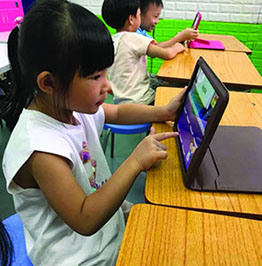
The digital world
By Joshua Feather


The use of iPads in the classroom has created a new dimension of learning for young learners. Different tools within these tablets can be used to enhance listening and speaking skills like never before. Children can access dictionaries with ease within these devices; such sources would only be in the form of hard copy before. Interaction with students has never been easier. Nowadays, the use of tablets in foreign language learning and teaching is slowly becoming the new theme; and such use brings benefits not only to learners but to educators as well.
As a 90's baby, I grew up in an education system where books were dominant and the use of touch screen devices was unheard of in foreign language learning. Mandarin was my foreign language and the use of iPads during that time was not on the agenda. Nowadays, the use of a 9.7-inch tablet is now on the menu and it is not uncommon to be seen replacing books in schools and education centers throughout Macao. Pui Ching Middle School Macao is an example of this, where young learners occasionally use iPads during lessons. If you were to ask me, tablets will dominate the education system of Macao by 2020. This in my eyes, is the new world.
As stated in a BBC article "iPads in the Classroom", assistant head teacher Anne Bazin works in a school where everyone (students, assistants and teachers alike) in the classroom is provided an iPad to use in and out of the classroom. According to Bazin, the biggest advantage is the improvement in communication. Documents can be transferred directly to students within the classroom so they can view the information in front of them while the teacher is explaining in front of the class. Bazin also mentioned that teachers will take attendance using an iPad. This means that there is a concrete record of information; including what classroom students are in and which children are at school. These are a few of the numerous benefits that tablets bring to educators and learners in the classroom.
I am currently in year four of Communication and I have just finished my internship. I interned at an English center which used iPads as an aid in the learning process. My job was to write a report on the use of iPads in teaching and learning. I also had to compare this to the traditional methods of teaching based on my own views. Throughout this period, I interviewed students, teachers and parents to obtain first-hand information on the different views on modern technology in foreign language teaching. One of the most important aspects to consider in this industry is the learners, and the young learners LOVED using this method to learn English.
"Using games from the iPad to learn grammar concepts makes me understand it quickly," nine years-old Jason said.
"Using iPad is fun as I can play English games with classmates and using many different ways [listening, spelling and writing] to learn English is fun," said Noby, seven years old.
Another student said that the iPad helped her remember the words [vocabulary] better. Other students also mentioned that using the iPad was fun as they learn English in a different way from using books.


The use of iPads in learning also stirred comments from parents. Grandfather of one of the children said he definitely felt the use of iPad was good in learning English as it could help them remember better by the use of games. The mother of Noby commented that the use of iPads was good and her daughter really enjoyed it. Her only concern was on the duration in which students used the iPad as she didn't want her daughter facing the screen for too long. Another concern was that children would only see the use of iPads as a time for 'play' rather than learning and this may hinder their processing of the foreign language.
I believe that the use of iPads is the way forward for the education industry. The benefits outweigh the drawbacks. The use of these devices is both appealing to students and parents. Although this is still not too popular for the time being, I believe that by 2020, all schools and education centers will be using these devices in foreign language learning and teaching in Macao.

BACK
Copyright © Umac Bridges Fall 2018